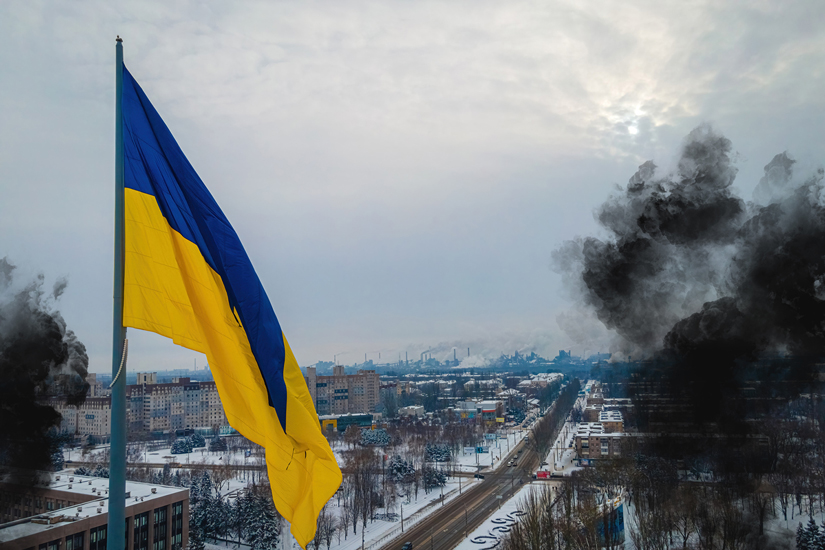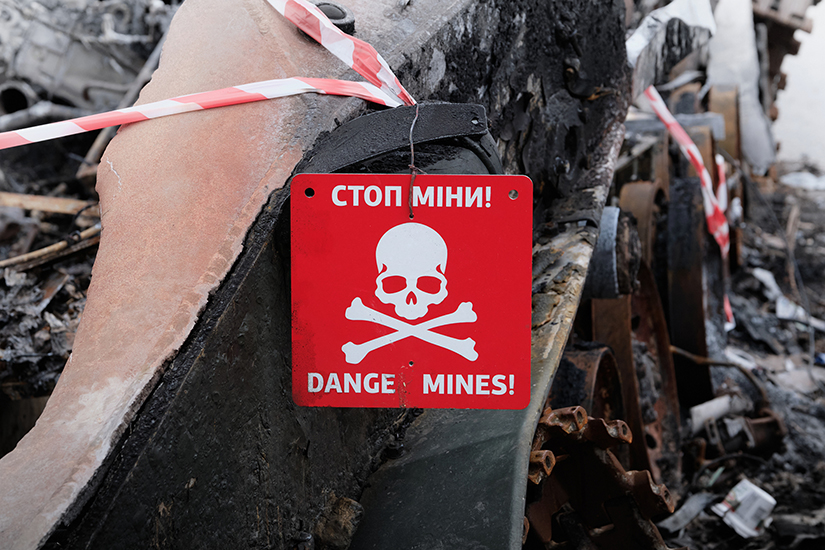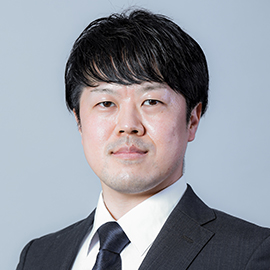Introduction: The OSCE and the points at issue in the discussions over Japan’s support for Ukraine
Japan hosted the G7 Summit in May 2023 and realized a visit to Japan by President Zelenskyy and the provision of Japan Ground Self-Defense Force vehicles to Ukraine.[1] Furthermore, in September the same year Foreign Minister Hayashi visited Ukraine when the G20 Summit was taking place, confirmed the creation of a bilateral document based on the Joint Declaration of the G7 and provided reconstruction materials. Japan has accepted more than 2,000 evacuees from Ukraine.[2] Through this series of responses, Japan has been able to once again promote its posture of integrated public and private support for Ukraine internationally. Nonetheless, there is a strong impression that the support is economy-centric, and the situation is that realization of the defense equipment transfer Ukraine desperately requires is difficult and support for the local private and public sectors in Ukraine is inadequate. In other words, as before, the discussions about Japan’s support for Ukraine lean toward content pertaining to defense equipment; furthermore, we can conclude that the recipients of the support are limited to the nation and Ukrainian residents in Japan, so there is room for consideration of issues such as the consistency of support. Based on this problem awareness and from the perspective of medium- to long-term support for the local public and private sectors in Ukraine, this paper refers to the example of the Organization for Security and Co-operation in Europe (OSCE), which has more experience regarding support based on a comprehensive security outlook for parties to a conflict, and shows the implications of that example for discussions concerning Japan’s support for Ukraine.

The engagement of the OSCE with Ukraine in times of war has shifted from the SMM to the SPU
As presented in my previous paper titled “Can the OSCE Stop the Ukraine War?,”[3] shortly after the start of the Ukraine war on February 24, 2022 the OSCE discontinued the operations of the Special Monitoring Mission (SMM) in that country. However, subsequently the OSCE has continued its engagement with Ukraine, its discussions concerning the Ukraine war involving both Ukraine and Russia are continuing in the various meetings in the OSCE held daily, and in addition the OSCE is implementing a variety of support for Ukraine in forms differing from the SMM. One of these forms of support is the Support Programme for Ukraine (SPU).
The launch of the SPU was announced in a November 1, 2022 press release.[4] This program, which is of indefinite duration and is run using contributions from OSCE participating States, has the objective of supporting Ukrainian citizens and the long-term democratic and social resilience of Ukrainian institutions and civil society organizations.[5] Specifically, it consists of 23 projects, which include diverse items focused on urgent security issues, such as humanitarian de-mining efforts, taking action against the threat of chemical substances, monitoring environmental destruction caused by the war, protecting refugees from the risk of human trafficking, and also support for judicial reform aimed at long-term national stability, strengthening of constitutional justice, and development of psychological support systems for victims of conflict, among others. Looking at the achievements since this program was launched, there are a total of more than a dozen projects, including those planned going forward. Briefly summarizing these support activities, the OSCE is taking action on the issues including security, education, gender equality, environmental protection, and legal support in a broad range of fields in Ukraine, and is implementing medium- to long-term support for the public and private sectors. Here, due to space constraints, we will focus on intangible and unique support and present three examples of initiatives.
SPU Example (i): Initiative to educate people about the landmine problem
One of the serious issues the present war has caused for Ukraine is landmines. A large number of landmines laid by the Russian military for defense on the front line as it retreated have been left in Ukraine, so now Ukraine is the country with the most serious landmine contamination on earth.[6] These landmines are a serious threat obstructing the civic lives of the community residents and reconstruction, so in conjunction with the international day for landmine awareness on April 4 the OSCE collaborated with the government of Ukraine to make a presentation to the citizens calling attention to landmines and introducing de-mining activities.[7] Moreover, it supported the participation of the government of Ukraine in an international symposium called Mine Action-2023 held for three days from May 3, which dealt with problems concerning landmines.[8] These various kinds of support pertaining to raising awareness of the dangers of landmines and de-mining are targeted at both the public and private sectors and have the characteristic that they are implemented in conjunction with international initiatives.

SPU Example (ii): Initiative for issues of a humanitarian character
Furthermore, in addition to visible issues such as landmines, Ukraine also faces the issues of gender-based problems, human trafficking, and war crimes.[9] In order to deal with this situation, the OSCE conducted training for law enforcement officers in charge of cybercrimes and human trafficking on June 2[10] and is implementing support taking into consideration the mental health of victims, for example by collaborating with an NGO to hold a meeting involving local lawyers in order to strengthen Ukraine’s capacity to deal with gender-based violence on June 16.[11] Furthermore, it is supporting an initiative to spread messages to citizens in conjunction with World Day Against Trafficking in Persons on July 30[12] and is working with a private company to provide advice on how to spot the warning signs, minimize risk, and get help.[13] Moreover, it is endeavoring to gather evidence of war crimes and is publishing reports summarizing the results of its investigations.[14] The above content can be said to be the kinds of support that only the OSCE can offer in times of war.
SPU Example (iii): Legal support initiative
Moreover, legal problems such as infringements of international humanitarian law have emerged as a result of war crimes.[15] On June 28, in response to the local need for legal support, the OSCE supported discussions on use of justice tools to defend human rights in Ukraine in times of war[16] and in addition collaborated with an NGO to hold a leadership seminar on law, justice, and society over the five days from July 12 to July 16.[17] Furthermore, it held a summer school on law for students multiple times in August and September.[18] These kinds of initiatives concerning legal support extend to a wide range of content, including initiatives pertaining to the constitution and initiatives surrounding international law and war crimes. Furthermore, the fact that they target young people in the public and private sectors suggests that they are aiming for a medium- to long-term effect.

Conclusion: Implications of the SPU by the OSCE for Japan’s debate about support
Up to this point we have provided an overview of the OSCE’s initiatives to support Ukraine in times of war, but there is no doubt that support for Ukraine, where the situation is still unstable, is placing large constraints on the implementation of the support items stipulated by the SPU. However, based on information such as the support timing, target, and content, they indicate that the OSCE is steadily implementing the items which are feasible at the current time from a medium- to long-term perspective.[19] Furthermore, we can conclude that these forms of support will benefit not only the local society of Ukraine in times of war but also post-war Ukrainian society. As described above, the OSCE is providing support through the SPU while still maintaining willingness to find solutions through dialogue and engaging with both Ukraine and Russia based on its comprehensive security concept.[20]
Finally, in light of the discussions concerning Japan’s support for Ukraine, in addition to the various types of support stated at the beginning of this paper, Japan and Ukraine have commenced consultations for the conclusion of a bilateral agreement based on the Joint Declaration of Support for Ukraine announced at the time of the G7 Summit.[21] However, can we really conclude that this kind of support by Japan is consistent medium- to long-term support for the public and private sectors in Ukraine? When it comes to security cooperation we always tend to focus only on supplying arms, but as seen in the example of the OSCE there is also the option of supporting Ukraine in a comparatively intangible form which addresses comprehensive security issues. Furthermore, this requires the approach of implementing coherent and long-lasting support in a form which involves working closely with the public and private sectors of Ukraine. While Japan works to enhance its presence in the international community, it must not forget that foreign countries, particularly those in the global south, are closely watching the engagement of other countries with Ukraine. Support which involves working sincerely and closely with other countries facing difficult situations will also promote the national interest of Japan.
(2023/11/30)
Notes
- 1 Ministry of Defense, “About the Provision of Equipment, etc. to Ukraine,” May 21, 2023.
- 2 Immigration Services Agency of Japan, “About the Status of Acceptance of and Support for Evacuees from Ukraine,” October 6, 2023.
- 3 Takuma Matsu, “Can the OSCE End the Ukraine War? ― Multilateral Security Challenges,” International Information Network Analysis (IINA), November 18, 2022.
- 4 OSCE, “New Donor-Funded Support Programme for Ukraine,” November 1, 2022.
- 5 Ambassador Michael Carpenter of the U.S. Mission to the OSCE mentioned in a briefing to the media that this program is of indefinite duration. Michael Carpenter, “Supporting Ukraine Against Russia’s Unjustified War through the Organization for Security and Cooperation in Europe (OSCE),” July 25, 2023.
- 6 Daniel Boffey, ”Ukraine desperate for help clearing mines, says defence minister,” The Guardian, August 13, 2023.
- 7 OSCE, “International Day for Mine Awareness and Assistance in Mine Action,” April 4, 2023.
- 8 This symposium is an event held every year by the Croatian Ministry of the Interior and Mine Action Centre. It gathers de-mining experts from around the world together to share best practices and unveil and learn about new technologies. For Ukraine it is a valuable forum for explaining the de-mining initiatives of the government and declaring the fields in which international support is necessary. OSCE, “Ukrainian Section at the International Symposium ‘Mine Action-2023’,” May 3-5, 2023.
- 9 OCHA, “UKRAINE HUMANITARIAN RESPONSE 2023 Situation Report,” September 5, 2023.
- 10 OSCE, “OSCE assists Ukrainian law enforcers in investigating cybercrimes and trafficking in human beings,” June 2, 2023.
- 11 OSCE, “Improved Response to Sexual Violence is in Focus of OSCE Project Assistance to Ukraine,” June 20, 2023.
- 12 OSCE, “OSCE Assists Ukrainian Partners in Spreading Safety Messages on the Occasion of the World Day Against Trafficking in Persons,” July 30, 2023.
- 13 The OSCE has established a dedicated, purpose-built site for these activities. OSCE, Tomson Reuters, “BE SAFE FROM HUMAN TRAFFICKING,” July 30, 2023.
- 14 OSCE, “Moscow Mechanism: ‘Report on Violations and Abuses of International Humanitarian and Human Rights Law, War Crimes and Crimes Against Humanity, Related to the Forcible Transfer and/or Deportation of Ukrainian Children to the Russian Federation’,” May 4, 2023.
- 15 Amnesty International, “UKRAINE 2022.”
- 16 OSCE, “OSCE supports discussions on use of constitutional justice tools to defend human rights in Ukraine in times of war,” June 28, 2023.
- 17 OSCE, “Law, Justice and Society. Leadership seminar,” July 12, 2023.
- 18 For example, the OSCE held a series of four summer schools in August. The schools attracted the participation of over 90 young legal professionals, students of law, and post-graduates and offered activities such as lectures, presentations, and mock trial competitions. OSCE, “Young Ukrainian Lawyers Enhance Their Understanding of Human Rights Protection Tools at a Series of OSCE-Supported Summer Schools,” August 31, 2023.
- 19 Outside the framework of the SPU, support for Ukraine by the OSCE includes indirect and direct support for Ukraine from the perspective of defending humanitarian law and a range of international laws. For example, on April 24, 2023 the OSCE held a Supplementary Human Dimension Meeting over two days in order to support international humanitarian law (IHL) and international human rights law (IHRL), with the participation of over 250 people from across the OSCE region, and it endeavors to contribute to an international order based on the rule of law. OSCE, “More Determination Needed by States to Prevent Breaches of International Law and Ensure Accountability During Conflict and Crisis, OSCE Leaders Say,” April 24, 2023.
- 20 OSCE Secretary General Helga Schmid stated in an interview with DW (Deutsche Welle: Germany’s international broadcaster) after the Ukraine war started, that the OSCE stood ready to fulfill one of its key tasks: working to rebuild peace and security in Europe. Marina Strauss, “OSCE Could Fulfill Potential after Ukraine War,” DW, May 23, 2022.
- 21 Presidential Office of Ukraine, “Ihor Zhovkva starts negotiations with Japan on bilateral agreement on security guarantees,” October 7, 2023.

